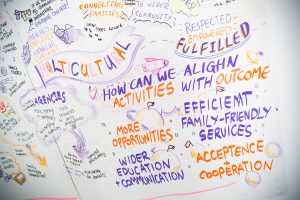Introduction
Several large population based studies have suggested that autism may be over-represented in some migrant groups in Western countries, such as the Somalis (Magnusson et al. 2012; Hewitt et al. 2013; Bolton et al. 2014; van der Ven et al. 2013; Becerra et al. 2014; Barnevik-Olsson et al. 2010; Lehti et al. 2013). The reasons for a higher prevalence of autism in these groups are still unclear, but it is acknowledged that immigrant populations require appropriate help and support in relation to autism services (Hewitt et al. 2013). Despite this need, it is also known that migrant populations are less likely to access health services, particularly those providing support for mental health or developmental disorders (Edbrooke-Childs et al. 2016; Teunissen et al. 2014; Fassaert et al. 2009). However, early diagnosis and intervention may lead to improved developmental trajectory and outcomes (Fernell et al. 2013).
The Somali migrant population in the UK largely comprises first generation migrants who sought refuge following the civil war in Somalia since the 1990s, and their descendants who were born in Britain. Nationally, Somali communities have one of the highest rates amongst migrant groups of poverty, unemployment and social and educational inequalities (Jabłonowski et al. 2013). The Somali population are the second largest migrant community in Bristol and the fourth largest Somali community among British local authorities (Bristol City Council 2013). Precarious employment and high health needs are characteristic of the Bristol Somali community, and are exacerbated by low English skills, limited access to training and lack of transferable skills (Jabłonowski et al. 2013). To our knowledge, there have been no published reports on the prevalence, the clinical diagnosis or community attitudes towards autism in Somalia. Furthermore, not much is known about the needs of the Somali migrant population raising children with autism, their experiences of the diagnostic process, barriers to care, culture specific aspects of seeking help from health, or education and social care services. Such information is essential in order to provide high quality services and reduce inequalities in care for this group.
The aim of this qualitative study was to address this gap in knowledge, in partnership with members of the Somali community in Bristol, to gain a better understanding of their perceptions, experiences, and support needs. Through in-depth interviews we explored how autism is seen and understood, how parents find out that their child has autism, and their experiences of accessing health, education and social care services.
